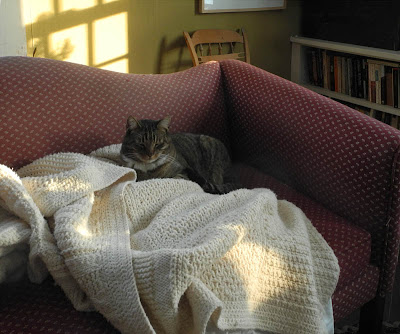Wouldn't it be wonderful if we could be like our cats, who dash around furiously and then, in a moment, settle down comfortably for a nice nap? I have been reading the words of writers, divided by more than a century, and by vastly different cultures, aiming to address our frenetic and tense lives, with much to say in common. In his 2009 book, no self no problem, Anam Thubten, a Tibetan Buddhist meditation teacher, writes that "meditation is about resting completely".
[Meditation] is simply the art of resting and relaxing.I wouldn't have thought that this Buddhist philosophy would in any way touch the thoughts of William James, the 19th century American psychologist and philosopher, but in his 1895 essay "The Gospel of Relaxation" he explains his theory of emotions, that
Complete rest includes letting go of all forms of mental effort....a deep rest, an inner rest, a rest in which we let go of all forms of mind's effort, including mind's effort to maintain this illusory self. I am speaking about a deep relaxation in which we are no longer trying to hold on to anything.
action and feeling go together, and by regulating the action, which is under the more direct control of the will, we can indirectly regulate the feeling, which is not.So, if we sit quietly and calmly, we will become calm and peaceful. Where the Buddhist asks us not to hold on to anything, William James tells us that if
we wish our trains of ideation and volition to be copious and varied and effective, we must form the habit of freeing them from the inhibitive influence of reflection upon them, of egoistic preoccupation about their results.
For by the sensations that so incessantly pour in from the over-tense excited body the over-tense and excited habit of mind is kept up; and the sultry, threatening, exhausting, thunderous inner atmosphere never quite clears away. If you never wholly give yourself up to the chair you sit in, but always keep your leg and body muscles half contracted for a rise...what mental mood can you be in but one of inner panting and expectancy, and how can the future and its worries possibly forsake your mind?He tells us to "unclamp", and the Buddhist teacher Kongtrul Rinpoche tells us to "let go". Both these philosophies, Buddhism and American pragmatism, show us a way forward, to relax the body and therefore the mind.
*I have written two other blog posts on William James' writing, on "Habit", and "On a Certain Blindness in Human Beings". He is a fascinating and eloquent writer.

Thank you. I very much enjoyed the pragmatist-Buddhist comparison. And actually its interesting that many of the Buddhist monks I listen to advocate allowing trains of ideation and volition rather than seeking to be without them. Anyway, that's what I'm trying to do!
ReplyDeleteYes, as James said, we'd like them to be "copious and varied and effective" but we have to separate them from the ego. I think the Buddhist monks would agree.
DeleteMay we all succeed in this!
You picked some great James quotes, Altoon.
ReplyDeleteBut I thought Buddhist meditation was work! Relaxation is a hot bath.
I guess relaxing the mind isn't easy, but I wouldn't call it work.
Delete